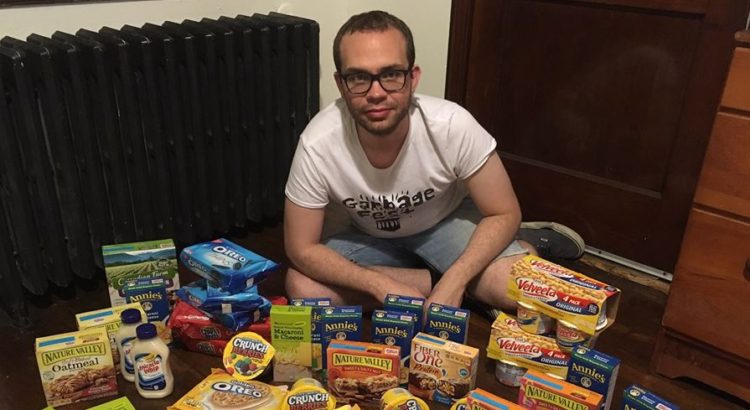Most of us would likely blanch at the thought of sorting through ambiguous public trash bags for a midday snack, not to mention actually consuming a box of salvaged strawberries. Yet in his 2017 documentary short, Trash Empire, filmmaker William Reid does exactly this and more – consuming exclusively food scraps and dumpster-salvaged foods over the span of 2 years. Before you question his sanity, here are the fast facts and food for thought: In the U.S, 40% of food produced each year is wasted. ‘Best by’ date labels are selected solely by manufacturers’ discretion. And yes, diving into publicly accessible dumpsters is, for the most part, legal in the U.S.
Reid’s documentary, which also functioned as his graduate thesis project at American University, is daring in its investigations, speckled with awkward humor, and, above all, informatively absurd. Through his ambitious trash diet, Reid strives to deconstruct the root cause of America’s silently raging food waste issue – his main target is not to vilify the consumer, because the crux of the problem can ultimately be traced back to government, industry, and the overproduction of food. Reid interviews an array of researchers and policymakers, all of whom share common ground in possessing greater insight on food waste and its contributing factors than the average American. Though many have the commonsensical awareness that food companies profit off of consumer misunderstandings, I was stunned with the sheer extent of day-to-day misinformation that we as consumers generally assume to be true and in our self-interest. Take the illusion of ‘best by’, ‘sell by’, or ‘use by’ dates; though we naturally assume that they are printed in order to prevent food poisoning, etc, these dates actually are not ‘science-based’, but rather craftily decided by manufacturers. Not only do these manufacturer-enforced food standards affect the frequency and quantity of ditching perfectly good food; they also penetrate grocery sellers’ practices. Reid emphasizes this endlessly through montages of extensive dumpster findings – boxes of juice, crated lettuce heads, bags upon bags of mini carrots – many of which are found in their original, unopened packaging, yet hastily discarded.
Another severely overlooked issue that Reid brings to light is that of food donations, in particular, that of unhealthy, empty-calorie foods composed of government subsidized crops: corn, wheat, and soy. Reid explains that in most cases, attractive tax incentives that fail to distinguish the value of fresh produce donations from unhealthy food donations lead to an excess of junk and snack foods in food banks. The flawed policies that fuel such skewed donations not only aggravate the health of food donation recipients but also fuel the vicious cycle of agricultural overproduction, junk food overflow, and food banks’ rejection of said junk food, resulting in even more wasted food.
I would highly recommend attending any future screenings of this eye-opening documentary! The Food Recovery Network at the University of Michigan did a great job in organizing this screening; listening to William Reid speak, in person, about his passion to fight against our ongoing ‘trash empire’ was a truly engaging experience.



Thanks so much for attending and for the kind review! I had a lovely time planning it, and I’m so happy Will got to come out. He’s such a fun, amazing person, and I’m glad you enjoyed him!!